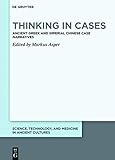Thinking in Cases : Ancient Greek and Imperial Chinese Case Narratives / ed. by Markus Asper.
Material type: TextSeries: Science, Technology, and Medicine in Ancient Cultures ; 11Publisher: Berlin ; Boston : De Gruyter, [2020]Copyright date: ©2020Description: 1 online resource (VII, 186 p.)Content type:
TextSeries: Science, Technology, and Medicine in Ancient Cultures ; 11Publisher: Berlin ; Boston : De Gruyter, [2020]Copyright date: ©2020Description: 1 online resource (VII, 186 p.)Content type: - 9783110640700
- 9783110669039
- 9783110668957
- CB311 .T45 2019
- online - DeGruyter
- Issued also in print.
| Item type | Current library | Call number | URL | Status | Notes | Barcode | |
|---|---|---|---|---|---|---|---|
 eBook
eBook
|
Biblioteca "Angelicum" Pont. Univ. S.Tommaso d'Aquino Nuvola online | online - DeGruyter (Browse shelf(Opens below)) | Online access | Not for loan (Accesso limitato) | Accesso per gli utenti autorizzati / Access for authorized users | (dgr)9783110668957 |
Frontmatter -- Preface -- Contents -- Introduction -- Structure and Meaning in the Case Records of the Massachusetts General Hospital -- Children and the Art of Medical Storytelling: Contemporary Practice and Hippocratic Case-taking Compared -- Storytelling in Greek Law Courts -- The Peripatetic Problems: Visions and Re-visions, That a Scholar Will Revise -- Thinking in Cases in Ancient Greek Mathematics -- Rhetoric, Treatment and Authority in the Medical Cases of Xiao Jing蕭京(1605–1672) -- Demonological Poison (Gudu 蠱毒) and Cutting the Flesh [to Make Medicine] (Gegu割股): A History of Two Case Histories -- Notes on Contributors -- Index Rerum Nominumque
restricted access online access with authorization star
http://purl.org/coar/access_right/c_16ec
Who is afraid of case literature? In an influential article ("Thinking in Cases", 1996), John Forrester made a case for studying case literature more seriously, exemplifying his points, mostly, with casuistic traditions of law. Unlike in modern literatures, case collections make up a significant portion of ancient literary traditions, such as Mesopotamian, Greek, and Chinese, mostly in medical and forensic contexts. The genre of cases, however, has usually not been studied in its own right by modern scholars. Due to its pervasiveness, case literature lends itself to comparative studies to which this volume intends to make a contribution. While cases often present truly fascinating epistemic puzzles, in addition they offer aesthetically pleasing reading experiences, due to their narrative character. Therefore, the case, understood as a knowledge-transmitting narrative about particulars, allows for both epistemic and aesthetic approaches. This volume presents seven substantial studies of cases and case literature: Topics touched upon are ancient Greek medical, forensic, philosophical and mathematical cases, medical cases from imperial China, and 20th-century American medical case writing. The collection hopes to offer a pilot of what to do with and how to think about cases.
Issued also in print.
Mode of access: Internet via World Wide Web.
In English.
Description based on online resource; title from PDF title page (publisher's Web site, viewed 28. Feb 2023)


